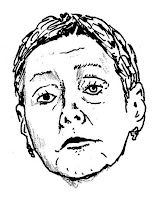Kathryn Johnston is a freelance journalist and researcher. She was born in Ballymena. Together with her late husband Liam Clarke she wrote the unauthorised biography of 'Martin McGuinness: From Guns to Government'. She is also the outgoing Women’s Officer of the Labour Party in Northern Ireland.
Brian John Spencer: "When did you first learn about the Easter Rising of 1916?" KJ:
"I don’t remember a time when I didn’t know about it, but I’m fairly sure that I can date my knowledge of it to the early civil rights movement in Derry."
BJS: "Do the men, the act or the stated ideals in the proclamation mean anything to you?" KJ:
"Funnily enough as a Ballymena woman I feel deeply connected to the Rising, through both place and family. On both my mother’s and my father’s side relatives of mine fought with the United Irishmen at the Battle of Antrim. They weren’t big names, just foot soldiers. And I’m very proud of those links, even though the United Irishmen did lose the Battle of Antrim!
I’m a member of the Labour Party in Northern Ireland and the Irish Labour Party and I’m also very proud that one of the co founders of the Irish Citizen Army with James Connolly came from Ballymena – Jack White. Through Jack White and James Connolly and the Irish Citizen Army, there is a direct link between the Labour Party and 1916.
And don’t forget the role of women in 1916; women like Winifred Carney, who was the only women at Connollly’s side in the GPO. Carney was armed with a typewriter and a Webley revolver, and went on to become a leading suffragist and trades unionist. I feel very strongly that in this decade of commemorations, we must remember the women whose contribution has often been ignored."
BJS: "When did you first learn about the Battle of the Somme?" KJ:
"I can’t remember exactly when, but I remember my grandmother talking about the slaughter. And of course when I read the war poets at school, their suffering resonated deeply with me."
BJS: "Does this act, the men and their determination to show their loyalty to Britain mean anything to you?" KJ:
"No. Like the senseless losses of the Rising in 1916 and the War of Independence of 1921, the Somme had more of an influence on my political awareness in the sense of realising the futility of war and the senseless slaughter in the trenches. As Yeats said in his poem Easter, 1916,
‘Too long a sacrificeCan make a stone of the heart.
O when may it suffice?’
I feel much more resonance with the Second World War and the Spanish Civil War which preceded it. My uncle, an RAF radio operator, was parachuted into Yugoslavia to support Tito and the Partisans. And of course, hundreds of brave Irish men and women, from both the North and South of Ireland, joined the International Brigade and fought against Franco in the Spanish Civil War, including Jack White, who served with the International Red Cross as a stretcher bearer."
BJS: "As a (British/Irish/Northern Irish*) person, is the 1916 Rising important to you and your sense of identity and sense of belonging on this island?" KJ:
"I define myself as both Irish and Northern Irish. Neither of these events are specifically important to me and my sense of identity and sense of belonging on this island. What matters more to me are the men and women who fought fascism in the Second World War and the Spanish Civil War."
BJS: "Will you be commemorating or celebrating either of these two events in April and July of this year respectively?" KJ:
"I will certainly be commemorating both of them, but neither event should be celebrated."
BJS: "Are you happy with the series of commemorative events put on by the Irish State? And what do you think of Arlene Foster's take on the events of Easter 1916 (she has refused to attend any commemorations)?" KJ:
“No. I think that it is time that NI politicians showed the same kind of leadership as that shown by Irish President Michael D Higgins and the Queen’
BJS: "As a person on (or from) the island are you happy with the where we are now at in terms of culture, cosmopolitanism and broad-mindedness?" KJ:
“No, certainly not. Racist and homophobic attacks are increasing. Women are still governed by the Offences Against the Person Act 1861 in the North and are denied access to full reproductive rights, including the right to choose. And the First and Deputy First Ministers have just instructed the Attorney General to make a last minute intervention in the judicial review being brought against Lord Morrow’s Human Trafficking Bill by Laura Lee, which criminalises sex workers."
BJS: "What are your hopes for the future of this divided province and island?" KJ:
"I hope that the people on both parts of this island can celebrate how much unites us and reject that which still threatens to divide us. And here’s the thing. As a feminist, as a socialist and as an internationalist, I believe that the people of Northern Ireland want a new type of politics, a new way of talking to each other about the issues that matter to all of us, the living wage, the right to choose, the right to equal marriage, a decent health service, comprehensive secular integrated education, I could go on, but you get the picture. It’s time for a radical, non sectarian alternative based on the Labour values of equality and human rights. It’s time that the Labour Party in Northern Ireland gave working people a voice. It’s time we exercised our right to stand..."



No comments:
Post a Comment